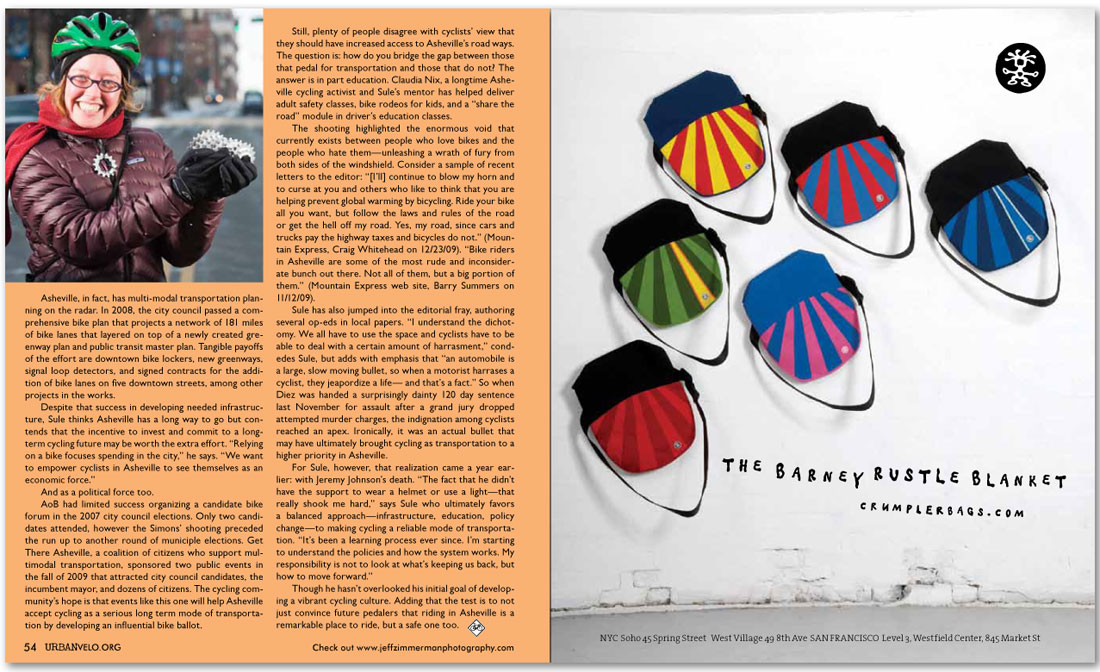


Asheville, in fact, has multi-modal transportation planning on the radar. In 2008, the city council passed a comprehensive bike plan that projects a network of 181 miles of bike lanes that layered on top of a newly created greenway plan and public transit master plan. Tangible payoffs of the effort are downtown bike lockers, new greenways, signal loop detectors, and signed contracts for the addition of bike lanes on five downtown streets, among other projects in the works.
Despite that success in developing needed infrastructure, Sule thinks Asheville has a long way to go but contends that the incentive to invest and commit to a long-term cycling future may be worth the extra effort. “Relying on a bike focuses spending in the city,” he says. “We want to empower cyclists in Asheville to see themselves as an economic force.”
And as a political force too.
AoB had limited success organizing a candidate bike forum in the 2007 city council elections. Only two candidates attended, however the Simons’ shooting preceded the run up to another round of municiple elections. Get There Asheville, a coalition of citizens who support multimodal transportation, sponsored two public events in the fall of 2009 that attracted city council candidates, the incumbent mayor, and dozens of citizens. The cycling community’s hope is that events like this one will help Asheville accept cycling as a serious long term mode of transportation by developing an influential bike ballot.
Still, plenty of people disagree with cyclists’ view that they should have increased access to Asheville’s road ways. The question is: how do you bridge the gap between those that pedal for transportation and those that do not? The answer is in part education. Claudia Nix, a longtime Asheville cycling activist and Sule’s mentor has helped deliver adult safety classes, bike rodeos for kids, and a “share the road” module in driver’s education classes.
The shooting highlighted the enormous void that currently exists between people who love bikes and the people who hate them—unleashing a wrath of fury from both sides of the windshield. Consider a sample of recent letters to the editor: “[I’ll] continue to blow my horn and to curse at you and others who like to think that you are helping prevent global warming by bicycling. Ride your bike all you want, but follow the laws and rules of the road or get the hell off my road. Yes, my road, since cars and trucks pay the highway taxes and bicycles do not.” (Mountain Express, Craig Whitehead on 12/23/09). “Bike riders in Asheville are some of the most rude and inconsiderate bunch out there. Not all of them, but a big portion of them.” (Mountain Express web site, Barry Summers on 11/12/09).
Sule has also jumped into the editorial fray, authoring several op-eds in local papers. “I understand the dichotomy. We all have to use the space and cyclists have to be able to deal with a certain amount of harrasment,” condedes Sule, but adds with emphasis that “an automobile is a large, slow moving bullet, so when a motorist harrases a cyclist, they jeapordize a life— and that’s a fact.” So when Diez was handed a surprisingly dainty 120 day sentence last November for assault after a grand jury dropped attempted murder charges, the indignation among cyclists reached an apex. Ironically, it was an actual bullet that may have ultimately brought cycling as transportation to a higher priority in Asheville.
For Sule, however, that realization came a year earlier: with Jeremy Johnson’s death. “The fact that he didn’t have the support to wear a helmet or use a light—that really shook me hard,” says Sule who ultimately favors a balanced approach—infrastructure, education, policy change—to making cycling a reliable mode of transportation. “It’s been a learning process ever since. I’m starting to understand the policies and how the system works. My responsibility is not to look at what’s keeping us back, but how to move forward.”
Though he hasn’t overlooked his initial goal of developing a vibrant cycling culture. Adding that the test is to not just convince future pedalers that riding in Asheville is a remarkable place to ride, but a safe one too.
Check out www.jeffzimmermanphotography.com
Crumpler